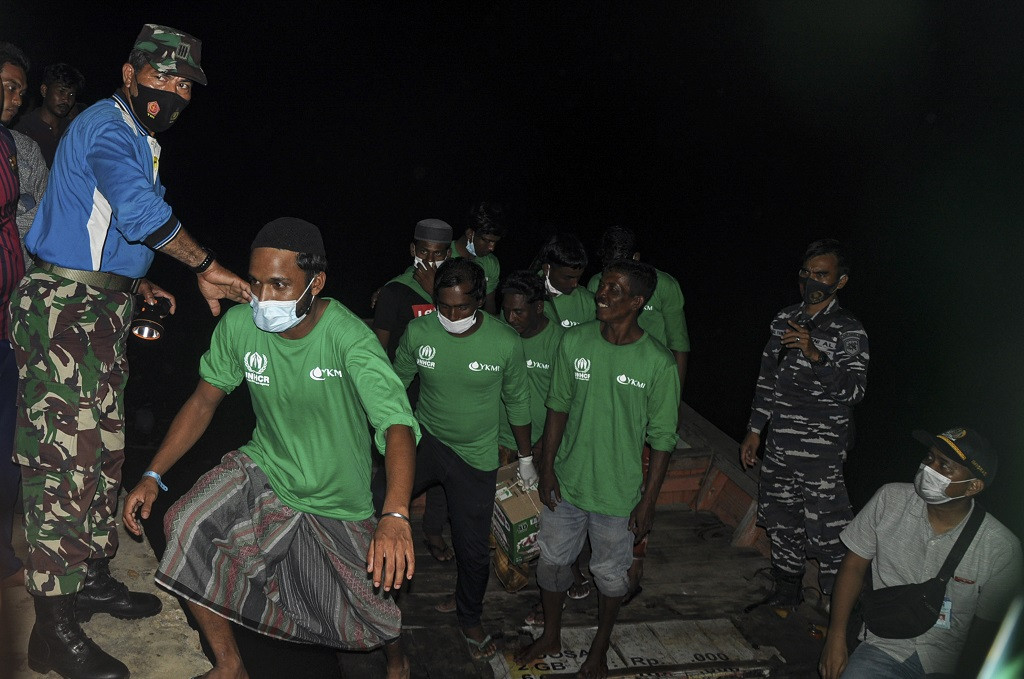Popular Reads
Top Results
Can't find what you're looking for?
View all search resultsPopular Reads
Top Results
Can't find what you're looking for?
View all search resultsRohingya refugee dies of COVID-19 amid lack of access to vaccines
The refugee population appears to have been excluded from ongoing COVID-19 vaccination schemes.
Change text size
Gift Premium Articles
to Anyone
A
Rohingya refugee died in Medan, North Sumatra, on Sunday, after being rushed to the hospital with severe symptoms of COVID-19.
Eshak Mohammad, 64, passed away at the University of North Sumatra (USU) hospital, where he had been receiving treatment for two days.
He was the first Rohingya refugee in Indonesia to die from the disease since the pandemic started, having spent the last nine years of his life in the Hotel Pelangi shelter in Medan without any family or next of kin.
Two officials confirmed his death on Sunday.
Vincentius Purwo Hendratmoko, the head of the Medan immigration detention center, revealed upon confirming Eshak's death that he had been buried at a local cemetery.
“[Eshak] died at 5 p.m. local time. His body was laid to rest at the COVID-19 burial ground in Simalingkar [in Medan],” Vincentius told The Jakarta Post on Monday.
A spokesman for the Medan COVID-19 task force, Mardohar Tambunan, also acknowledged that a Rohingya refugee had died of COVID-19 and that task force officials had observed the 3Ts of testing, tracing and treatment in handling the case.
“Our people are already taking care of it,” he said.
Indonesia is currently grappling with a nationwide second wave of COVID-19 cases, with infections and deaths surging to unprecedented levels due to the spread of the more transmissible Delta variant.
The government has pumped ample resources into fast-tracking its free immunization program despite a global shortage of vaccines, seeking to protect at least 70 percent of the population and improve its poor testing rate.
However, the refugee population appears to have been excluded from ongoing COVID-19 vaccination schemes, though recent arrivals by boat had reportedly been screened and inoculated.
Another refugee at the shelter, Mohd Rohim, 32, said not one of the 200-plus Rohingya refugees had been vaccinated against COVID-19, despite having already filed requests. He further claimed no health examinations had been carried out on the refugees at Hotel Pelangi.
“Since COVID-19 appeared, none of us have ever gotten a health examination. Only a few people got a checkup and only after Eshak was [found] COVID-19 positive,” said Rohim, who has been living at the shelter for a decade.
Read also: Fresh wave of Rohingya arrivals moved to Medan
He said Eshak had been ill since July 19 but that was tested a week later, after International Organization on Migration (IOM) doctors examined him.
“At the start, Eshak got a fever and diarrhea, but he was still able to walk around. It wasn’t until recently that his condition declined, and the results from the examination revealed he was COVID-19-positive. Eshak was promptly rushed to the hospital because he was experiencing difficulties breathing," Rohim told The Jakarta Post on Tuesday.
So far, seven Rohingya refugees have tested positive for COVID-19 at the shelter, including two of Eshak’s roommates. Both were rushed to the hospital on Tuesday.
Rohim said he did not know how Eshak had been exposed to the virus but noted that two days before Eshak became sick, the owner of Hotel Pelangi had reportedly died of COVID-19. He added that dozens of chickens farmed on-site had suddenly died.
Rohim conceded that many of the refugees staying at the shelter had been sick, including himself.
“I had a bout of fever, as did many refugees here. But the fever broke after I took some medication,” he said, without specifying the drugs that he had taken.
Not being a party to the 1951 Convention relating to the Status of Refugees or its 1967 Protocol, Indonesia has authorized the United Nations High Commissioner for Refugees (UNHCR) to carry out its refugee protection mandate and to identify solutions for the 13,497 refugees recorded in the country as of March.
Refugees from Myanmar, which include the stateless Rohingya minority, make up the fourth-largest group in the refugee population nationwide, just after Afghans, Somalians and Iraqis.
The Health Ministry, through a circular issued on June 10 last year, has assured that all registered refugees would have access to COVID-19-related services. However, there are currently no plans to vaccinate refugees.
“At this point, the government is focusing its resources on vaccinating the national population," Siti Nadia Tarmizi, a Health Ministry spokeswoman, said on Tuesday.
Meanwhile, the UNHCR “continues to advocate” for refugees to be included in the COVID-19 vaccine rollout, according to a report from its Indonesia office in February.
— Nina A. Loasana contributed to the report.










